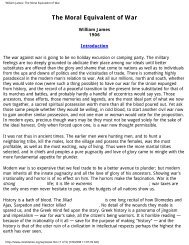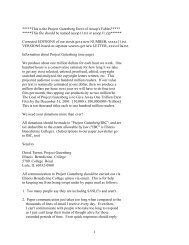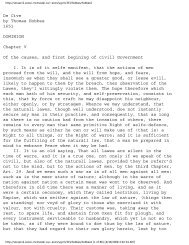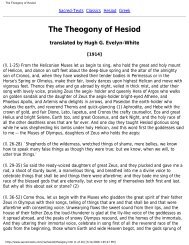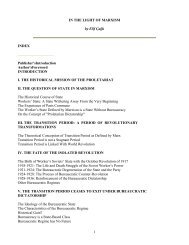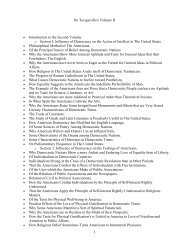Project Gutenberg Etext of The Large Catechism, by Martin Luther
Project Gutenberg Etext of The Large Catechism, by Martin Luther
Project Gutenberg Etext of The Large Catechism, by Martin Luther
You also want an ePaper? Increase the reach of your titles
YUMPU automatically turns print PDFs into web optimized ePapers that Google loves.
eadth, and at length public wrong and violence follow.<br />
<strong>The</strong>refore we allow these commandments to remain in their ordinary<br />
meaning, that it is commanded, first, that we do not desire our<br />
neighbor's damage, nor even assist, nor give occasion for it, but<br />
gladly wish and leave him what he has, and, besides, advance and<br />
preserve for him what may be for his pr<strong>of</strong>it and service, as we should<br />
wish to be treated. Thus these commandments are especially directed<br />
against envy and miserable avarice, God wishing to remove all causes<br />
and sources whence arises everything <strong>by</strong> which we do injury to our<br />
neighbor, and therefore He expresses it in plain words: Thou shalt not<br />
covet, etc. For He would especially have the heart pure, although we<br />
shall never attain to that as long as we live here; so that this<br />
commandment will remain, like all the rest, one that will constantly<br />
accuse us and show how godly we are in the sight <strong>of</strong> God!<br />
Conclusion <strong>of</strong> the Ten Commandments.<br />
Thus we have the Ten Commandments, a compend <strong>of</strong> divine doctrine, as to<br />
what we are to do in order that our whole life may be pleasing to God,<br />
and the true fountain and channel from and in which everything must<br />
arise and flow that is to be a good work, so that outside <strong>of</strong> the Ten<br />
Commandments no work or thing can be good or pleasing to God, however<br />
great or precious it be in the eyes <strong>of</strong> the world. Let us see now what<br />
our great saints can boast <strong>of</strong> their spiritual orders and their great<br />
and grievous works which they have invented and set up, while they let<br />
these pass, as though they were far too insignificant, or had long ago<br />
been perfectly fulfilled.<br />
I am <strong>of</strong> opinion indeed, that here one will find his hands full, [and<br />
will have enough] to do to observe these, namely, meekness, patience,<br />
and love towards enemies, chastity, kindness, etc., and what such<br />
virtues imply. But such works are not <strong>of</strong> value and make no display in<br />
the eyes <strong>of</strong> the world; for they are not peculiar and conceited works<br />
and restricted to particular times, places, rites, and customs, but are<br />
common, every-day domestic works which one neighbor can practice toward<br />
another; therefore they are not <strong>of</strong> high esteem.<br />
But the other works cause people to open their eyes and ears wide, and<br />
men aid to this effect <strong>by</strong> the great display, expense, and magnificent<br />
buildings with which they adorn them, so that everything shines and<br />
glitters. <strong>The</strong>re they waft incense, they sing and ring bells, they light<br />
tapers and candles, so that nothing else can be seen or heard. For when<br />
a priest stands there in a surplice embroidered with gilt, or a layman<br />
continues all day upon his knees in church, that is regarded as a most<br />
precious work which no one can sufficiently praise. But when a poor<br />
58



